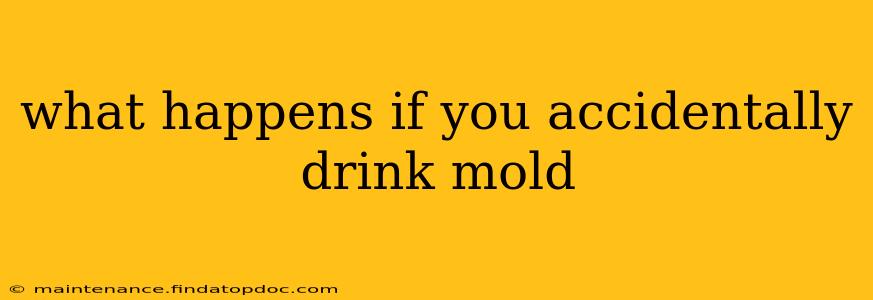What Happens If You Accidentally Drink Mold?
Accidental ingestion of mold isn't necessarily a cause for immediate panic, but it's crucial to understand the potential consequences and how to react. The severity of the reaction depends on several factors, including the type of mold, the amount ingested, and the individual's health.
While most people experience minimal effects from a small amount of mold, it's important to address this situation with caution and awareness. This article will explore the potential outcomes and guide you through the necessary steps.
What are the potential health effects of drinking mold?
The effects of accidentally drinking mold can range from mild to severe, depending on various factors. Some common reactions include:
-
Mild Allergic Reactions: Many individuals have mold allergies. Ingesting even a small amount of mold spores can trigger allergic symptoms like sneezing, coughing, itchy throat, or mild nausea. These symptoms are usually temporary and resolve on their own.
-
Gastrointestinal Distress: Consuming mold can lead to upset stomach, diarrhea, vomiting, and abdominal cramps. The severity depends on the amount and type of mold ingested.
-
More Severe Reactions: In individuals with compromised immune systems or severe mold allergies, ingesting mold can lead to more significant health problems, including:
- Respiratory infections: Mold can exacerbate existing respiratory conditions like asthma or bronchitis, potentially leading to severe infections.
- Mycotoxicosis: This is a severe illness caused by the toxins produced by certain types of mold. Symptoms can include fever, chills, muscle aches, and neurological problems. This is less common but a serious consideration.
-
No noticeable effects: In many cases, accidentally ingesting a small amount of mold may not produce any noticeable symptoms at all.
What types of mold are most dangerous?
Not all molds are created equal. Some molds produce mycotoxins, potent substances that can cause serious health problems. These include:
- Aspergillus: A common genus of mold that can produce aflatoxins, known carcinogens.
- Stachybotrys (Black Mold): Often associated with water damage, this mold can produce mycotoxins that are potentially harmful.
- Fusarium: Another mold genus that can produce toxins affecting the lungs and other organs.
It's important to note that identifying the specific mold species requires laboratory analysis, which is usually only undertaken in cases of severe reactions or prolonged exposure.
What should I do if I think I drank mold?
If you suspect you've accidentally ingested mold, the first step is to assess the situation.
- Evaluate the amount and source: How much mold do you think you consumed? Was it a visible clump, or just a few spores? Knowing the source can help determine the type of mold.
- Monitor your symptoms: Pay close attention to any symptoms that develop, such as digestive upset, respiratory issues, or allergic reactions.
- Hydrate: Drink plenty of fluids to help flush your system.
- Seek medical attention: If you experience severe symptoms like difficulty breathing, chest pain, or severe gastrointestinal distress, seek immediate medical attention. If you have a compromised immune system, consult your doctor regardless of the severity of symptoms.
How can I prevent accidental mold ingestion in the future?
Prevention is key. Here are some steps you can take to minimize the risk of accidental mold ingestion:
- Regularly clean and inspect your home: Pay close attention to areas prone to moisture, such as bathrooms and kitchens. Address any leaks or water damage promptly.
- Proper food storage: Store food properly to prevent mold growth. Discard any food showing signs of mold.
- Air filtration: Consider using air filters, especially in areas with known mold problems, to reduce the number of mold spores in the air.
Disclaimer: This information is for educational purposes only and does not constitute medical advice. Always consult a healthcare professional for diagnosis and treatment of any health concerns. If you have concerns about mold exposure or ingestion, seek professional medical advice immediately.
